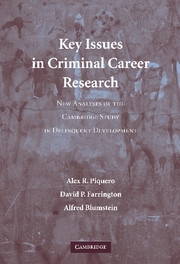 Key Issues in Criminal Career Research
Key Issues in Criminal Career Research Published online by Cambridge University Press: 30 July 2009
We use data from a classic, large-scale, longitudinal study to examine the patterning of criminal activity: the Cambridge Study in Delinquent Development. We provide a description of (1) the sample, (2) measures of offending, (3) attrition, and (4) the social context in which the data were first collected.
Cambridge Study in Delinquent Development
Description of the Sample
The Cambridge Study in Delinquent Development (CSDD) is a prospective longitudinal survey of the development of antisocial and offending behavior in 411 South London boys, mostly born in 1953. The study began in 1961, and for the first 20 years it was directed by Donald West; in 1969, David Farrington joined the team and has been the director of the study since 1981. The original aim of the study was (1) to describe the development of delinquent and criminal behavior in inner-city males, (2) to investigate how well it could be predicted in advance, and (3) to explain why juvenile delinquency began, why it did or did not continue into adult crime, and why adult crime often ended as men reached their 20s. The main focus was on continuity and discontinuity in behavioral development, on the effects of risk factors and life events on development, and on predicting future behavior. Major results of the CSDD can be found in four books (West, 1969, 1982; West and Farrington, 1973, 1977) and in more than 100 papers by Farrington (2003b).
To save this book to your Kindle, first ensure [email protected] is added to your Approved Personal Document E-mail List under your Personal Document Settings on the Manage Your Content and Devices page of your Amazon account. Then enter the ‘name’ part of your Kindle email address below. Find out more about saving to your Kindle.
Note you can select to save to either the @free.kindle.com or @kindle.com variations. ‘@free.kindle.com’ emails are free but can only be saved to your device when it is connected to wi-fi. ‘@kindle.com’ emails can be delivered even when you are not connected to wi-fi, but note that service fees apply.
Find out more about the Kindle Personal Document Service.
To save content items to your account, please confirm that you agree to abide by our usage policies. If this is the first time you use this feature, you will be asked to authorise Cambridge Core to connect with your account. Find out more about saving content to Dropbox.
To save content items to your account, please confirm that you agree to abide by our usage policies. If this is the first time you use this feature, you will be asked to authorise Cambridge Core to connect with your account. Find out more about saving content to Google Drive.